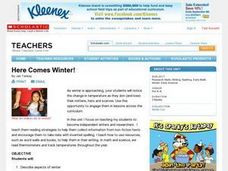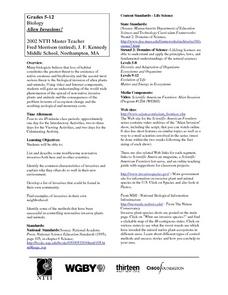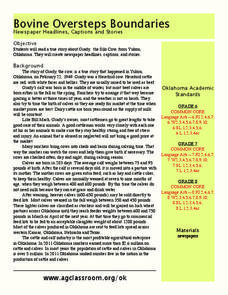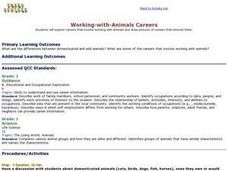Curated OER
Fin, Feathers, or Fur?
Students learn how to classify animals. For this animal characteristics lesson, students read Granddad's Animal Alphabet Book, brainstorm a list of different kinds of animals, and determine their characteristics; fur, feathers or scales....
Curated OER
Variation
Students recognize similarities and differences in plants. In this plants and animals lesson, students begin to classify living things by observable characteristics. Students watch clips from the Internet and play online games. Students...
Curated OER
Levels of Classification
Students use diagrams to compare structural differences that taxonomists use to classify animals. In this classification lesson plan, students compare structures of different species from given diagrams. In one diagram they identify the...
Curated OER
Classification of Intertidal Organisma
Students categorize animals. In this animal classification lesson plan, students group animals by their characteristics. Students break into groups and work together to classify the animals. Students fill out a graphic organizer with...
Curated OER
"Lions and Tigers and Bears-Oh MY!"
Students explore the characteristics of an animal. What do all animals need to live and can what we expect to accomplish by studying about animals. They keep a science journal daily.
Curated OER
Alligators
Students investigate the characteristics of alligators. In this animal science activity, students sing a song to identify the parts of an alligator. Students draw a picture of their own alligator.
Curated OER
Classifying Conundrum
Fourth graders identify plant characteristics from different environments and communicate that information in different ways. They use a simple scheme to classify Utah plants and animals and make observations and record them in a...
Curated OER
So You Think You're Tough
Fourth graders learn how to classify animals. In this invertebrates lesson, 4th graders discuss how we classify thinks into groups and move into a discussion about classifying animals. Students learn about the differences between...
Curated OER
Habitats
Second graders identify characteristics of various habitats. In this habitats lesson, 2nd graders read Where the Forest Meets the Sea and Swimmy to identify the settings of different habitats. Students construct murals of different...
Curated OER
What's Wild?
Third graders define domesticated animal and wildlife. In this animal lesson, 3rd graders cut pictures out of magazines of both types of animals and make two collages with the pictures.
Curated OER
Animal Classification
Third graders differentiate between vertebrates and invertebrates, and identify the main characteristics of mammals, fish, reptiles, amphibians, and birds. They sort and categorize different types of balls, discuss the characteristics...
Curated OER
Venn Diagram
In this science related worksheet, students research animals that are nocturnal (night animals) and diurnal (day animals) and place them in a Venn diagram. Students write characteristics about these animals that are alike, different and...
Curated OER
Here Comes Winter!
Students investigate winter behaviors in animals. They describe winter and write about the characteristics of the season by drawing and labeling a winter picture. Students then conduct research on a chosen animal and create a chart. ...
Curated OER
Alien Invasions!
Students use video and Internet components, to gain an understanding of non-native invasive plants and animals and the ecological and monetary problems they cause.
Curated OER
Where Are the Dinosaurs?
Young scholars investigate dinosaurs. For this life science lesson, students watch video clips on the website http://dsc.discovery.com/convergence/dinos/video/video.html and discuss the characteristics of the dinosaurs. Young scholars...
Curated OER
Bovine Oversteps Boundaries
Sixth graders read about Grady, the Silo Cow and analyze the parts of a news story. In this news article instructional activity, 6th graders discuss writing for different purposes. Students discover the characteristics of a strong...
Curated OER
Tall Tales
Students examine the characteristics of tall tales and how exaggerations are used. They create a character that is larger than life, they brainstorm attributes for their character, before writing a Tall Tale. They plan out their story,...
Curated OER
Soak it up
Students complete a hands on activity using hard boiled eggs, food coloring, tape, cups, water, and a knife to show how permeability affects animals. In this permeability lesson plan, students complete this activity and learn how...
Curated OER
Animal Characteristics
Students investigate biology by completing a group classification activity. In this animal characteristics, students discuss the different families in the animal kingdom and the small differences that separate the animals. Students...
Curated OER
Working-with-Animals Careers
First graders list and discuss careers that involve working with animals and draw pictures of careers that interest them. They compare and contrast domestic and wild animals.
Curated OER
Characteristics of Materials
Young scholars describe and compare common properties of various classroom materials. In this science/matter lesson, students observe common classroom items and the materials they are made of to complete a list of common properties.
Curated OER
Rain Forest Characteristics
In this earth science worksheet, learners answer 5 questions about the rain forest. They write about the characteristics of this biome, and describe the animals, plants, location, and climate.
Curated OER
Classification of Animals
Students identify observable features of eight dinosaurs and create a sorting chart using SMART Notebook on a SMART Board (or, in case you do not have a SMART Board, a chalk or dry-erase board).
Curated OER
Feeding Frenzy
Young biologists take a look at the myriad of ways that animals increase their chances of surviving in the wild. The adaptations help animals hide, hunt, and attract a mate. This lesson specifically explores how insect mouth parts are...

























